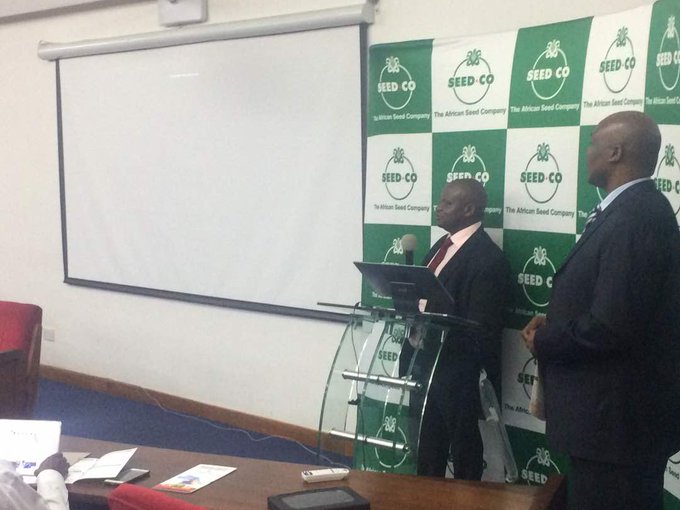Seed Co Limited, the leading certified seed company authorised to market seed varieties developed by itself, government and other associated seed breeders in over fifteen (15) African countries has provided an overview of winter cereals for this season.
Seed Co Group Chief Executive Mr. Morgan Nzwere revealed at the recent Annual General Meeting that the company has maintained a strong market share among communal and commercial farmers from years of intensive investment in research and development. However, production of winter cereals in Zimbabwe and globally was lower compared to the same period last year.
“Globally winter cereal sales of 5,392mt were recorded compared to the 6,840mt achieved in prior year, a decrease of 21%. In Zimbabwe winter cereal volumes at 3,855mt were 32% lower than the 5,635mt achieved in prior year largely owing to irrigation water shortage dampening demand; crippling power cuts which paralysed farming activities; and slow-down in trade channel placement amidst pricing confusion.
“In Zambia, sales firmed to 1,537 mt. in current year compared to 1,023mt in prior year pushed by stable wheat demand and early maize exports into the region. We have also registered just above 300mt maize sales in Nigeria. Margins were stable across markets despite pricing and value preservation challenges in Zimbabwe,” Mr. Nzwere said.
He said new products have been developed in maize, soybean, rice and wheat. The seed crops have been broadened by the introduction of rain-fed rice as an additional summer cereal crop.
Regarding maize, new products have been added to the basket in East Africa and Malawi. A climate smart, high yielding and cob tolerant hybrid, SC 661, has been registered in Kenya. An MLN disease tolerant hybrid (SC441) was also registered in Kenya. Four climate smart and highly productive hybrids- SC301, SC423, SC649 and SC653 have been registered in Malawi.
To meet the insatiable demand for oil seeds in East Africa three new soybean varieties have been released. Two rust resistant soybean varieties (SC Signal, SC Saxon) and one conventional soybean variety “SC Semeki” have been registered in Tanzania.
In Zimbabwe and Zambia, new small grain varieties have been added to the portfolio to enhance competitiveness and improve food security. One climate smart Wheat variety, SC W9101, has been registered in Zimbabwe. This variety is adapted to deficit irrigation and would complement SC Select in the winter cereals basket. Three rice varieties (SC OP02, SC OP04 and SC OP08) have been licensed and seed production has been initiated, in Zambia and Zimbabwe.
“Group wide, we have sizeable maize carryover stock (16,000mt) to augment current production (51,000mt) to satisfy rebound demand across markets on better rainfall prospects. The Group is expecting improved seed deliveries compared to prior year. In terms of maize, last year we took in 49,000mt and this year we are expecting to receive 51,000mt, an increase of 4%. Regarding soya beans we had 8,100mt compared to 7,000mt in prior year of which close to 80% has already been received for processing. Maize seed deliveries are currently at about 50% in Zimbabwe and 40% in the region. Local production in Kenya and Tanzania is increasing from 6200mt in prior year to 6900mt in current year.”
In Zimbabwe, Seed Co has to date collected ZWL$24.6M from debtors, including ZWL$7M for the vegetable business, since last year-end. In the region, since year-end, the company has collected US$10.1m from debtors and collection efforts are continuing.
Local borrowings in Zimbabwe for seasonal requirements are at weighted-average cost of 23% p.a. Local borrowing costs have gone up in line with inflationary pressures albeit amidst a serious liquidity crunch. Mr. Nzwere said United States Dollar borrowings for regional operations are all now at an all-in cost of 6.1% p.a.
“In Zimbabwe, whilst as a business we are doing everything within our control to prepare for the main selling season, the operating environment is increasingly becoming unpredictable. On the positive, the recent Supplementary Budget confirmed Government’s continued agricultural sector support, and in particular, maize and soybean cultivation this coming season. The Government is targeting 210,000ha for maize and 30,000ha for soybean under the Presidential Input Program and a further 640 000 ha for maize and small grains under support for the Vulnerable Groups. On the other hand, the vegetable joint venture is expected to continue growing although availability of forex to import required seed could be a major bottleneck. A stable performance is expected from the associate, Quton Zim. From the regional operations, we anticipate rebound performance with adequate product and better rainfall forecasts, unlike last year when our markets were badly affected by drought,” Mr. Nzwere added.
